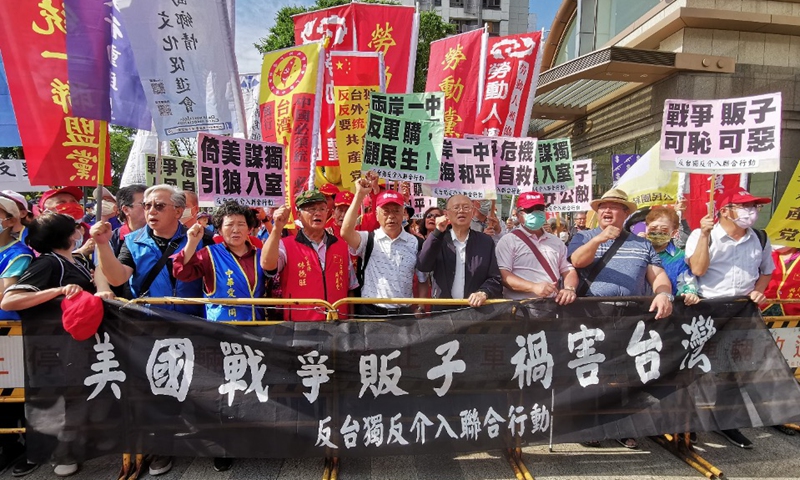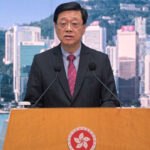Deputy regional leader of Taiwan island Lai Ching-te concluded his recent “transit” trip to the US on Friday. During his trip, he stopped at New York on his way there and made a “stopover” in San Francisco on the way back. He made sure not to waste a single second during his brief stay in the US, seizing every opportunity to propagate “Taiwan independence” rhetoric and express loyalty to the US in order to advance the agenda of “relying on the US to seek independence.” Lai also openly met with high-ranking US officials in Paraguay. During the six days, he intensified his collusion with the US, turning the entire trip into a brazen provocation and disruption of the one-China principle, as well as a reckless challenge and damage to peace and stability across the Taiwan Straits.
Meanwhile, many people may have noticed that despite China’s objections, the US chose to engage in moves to harm Taiwan and receive Lai but with a relatively low level of reception. Several US media outlets have used the term “low-key” to describe Lai’s “transit”, which is a rather polite description. To put it bluntly, the US didn’t give Lai any true benefit nor any respect. For the Democratic Progressive Party (DPP), which has always treated “transiting the US” as a significant test, this situation is undeniably embarrassing. Nevertheless, even in this scenario, the “pragmatic Taiwan independence separatists” continued to display subservience, gratitude, and managed to conspicuously wear the label of embarrassment.
The reason Washington has been particularly “low-key” is partly due to Lai’s obvious ulterior political motives. He is eager to use this “transit trip” to gain momentum for his bid as a candidate for leadership in the Taiwan region, hoping the US could endorse his “Taiwan independence” actions and rhetoric. Many analysts believe that given Lai’s past radical “Taiwan independence” rhetoric and behavior, Washington is reluctant to overtly “support” him, as it could lead to the destabilization of the cross-Straits situation and entangle the US into crisis.
This also indicates that the collusion between Washington and the DPP involves their respective dirty political calculations, and behind the outwardly high-profile “friendship,” there lies internal disarray.
It needs to be emphasized that the so-called “low-key” approach is by no means an indication of any change in the US’ interference in the Taiwan question, nor is it “a gesture of goodwill” toward the Chinese mainland. Allowing Lai’s “transit” has seriously violated the one-China principle and the Three US-China Communiques, which significantly damaged China’s sovereignty and territorial integrity. This cannot undergo any change in nature due to the high-profile or low-key stance of the US.
Under no circumstances can “Taiwan independence” separatists transit the US under any pretext or for any reason. Otherwise, they should foresee the firm countermeasures from the mainland and the ensuing consequences, which they will undoubtedly face.
There are two widely circulated characterizations of Lai: an unyielding “Taiwan independence” separatist and an outright troublemaker. These labels have once again been unequivocally validated during Lai’s recent “transit” trip to the US. Lai displays a submissive and servile attitude facing the US, without any shame. Moreover, he is obsessed with the sinful act of “seeking independence relying on the US” without any sense of guilt.
This US “transit” has exacerbated tension across the Straits. Even more concerning is that individuals like Lai, who repeatedly engage in such “transits” to the US, cast a thick shadow over the prospects of peaceful reunification across the Straits.
It must be stated that without the collusion of the “Taiwan independence” forces with external forces for separatist purposes, peaceful reunification across the Taiwan Straits would naturally evolve as the logical outcome, ensuring the fundamental guarantee of peace and stability in the region. However, the DPP authorities, especially “peace destroyers” like Lai fervently pursue “Taiwan independence,” willingly act as pawns for the US and the West to “contain China with Taiwan,” betraying national interests. Their relentless persistence in seeking “independence with US support” puts the region in a perilous state of potential conflict and danger.
Currently, the US and Western countries and the DPP authorities often mention “peace and stability across the Taiwan Straits,” repeatedly emphasizing the tension in the region. They attempt to shift the blame for this situation onto the Chinese mainland, conveniently neglecting the fact that it is their “Taiwan independence” provocations and interference from the US and the West that have disrupted the conditions and environment for peace in the region.
Lai, as a typical example of “Taiwan independence” separatists, surprisingly uses the term “peace” as part of his rhetoric. He is evidently aware that the mainstream public opinion on the island favors peaceful development and cooperative exchanges, rejecting any notion of DPP warmongering. In his pursuit of votes, Lai diligently tries to downplay his “Taiwan independence” color, using the “peace” card. This is a blatant stain on the concept of “peace.”
(Global Times)




